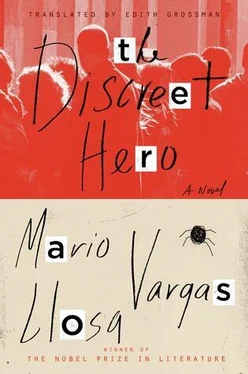“I’d like to speak to the chief, please,” said Felícito, handing him his card.
“He’s on vacation for a few days,” the officer explained. “If you like, Sergeant Lituma can take care of you. He’s in charge of the station for now.”
“I’ll talk to him, then. Thank you.”
He had to wait a quarter of an hour before the sergeant deigned to see him. By the time the officer had him go into the small cubicle, Felícito’s handkerchief was soaked from wiping his forehead so often. The sergeant didn’t stand to greet him. He extended a plump, damp hand and indicated the empty chair across from him. He was a stocky man, tending toward fat, with narrow, affable eyes and the beginnings of a double chin that he rubbed from time to time with affection. The khaki shirt of his uniform was unbuttoned and had circles of perspiration under the arms. On the small desk was a fan that did work. Felícito was grateful for the gust of cool air that caressed his face.
“How can I help you, Señor Yanaqué?”
“I just found this letter. It was stuck to my front door.”
He watched Sergeant Lituma put on a pair of glasses that made him look like a shyster lawyer and, with a tranquil expression, read the letter.
“Well, well,” he said finally, making a face that Felícito couldn’t interpret. “This is the result of progress, sir.”
When he saw the trucker’s confusion, he shook the letter in his hand and explained. “When Piura was a poor city, these things didn’t happen. Who would have thought back then to demand money from a businessman? Now that there’s money around, the smart guys play rough and try to make hay while the sun shines. The Ecuadorans are to blame. They distrust their government and bring their capital here to invest it. They’re using us Piurans to stuff their pockets.”
“That’s no consolation, Sergeant. Besides, listening to you, it would seem like a problem that things are going well now in Piura—”
“I didn’t say that,” the sergeant interrupted him quickly. “It’s just that everything has its price in this life. This is the price of progress.”
The sergeant shook the letter with the spider in the air again, and it seemed to Felícito Yanaqué that his dark, plump face was mocking him. A yellow-green light, like the one in the eyes of iguanas, flashed in the sergeant’s eyes. At the back of the station he could hear a voice shouting, “The best asses in Peru are here in Piura! I’ll swear to that, damn it!” The sergeant smiled and raised his finger to his temple. A very serious Felícito felt claustrophobic. There was barely room for the two of them between the grimy wooden partitions covered with announcements, memos, photos, and newspaper clippings. The office smelled of sweat and age.
“The son of a bitch who wrote this is a good speller,” the sergeant declared, looking at the letter again. “At least I don’t see any grammatical mistakes.”
Felícito felt his blood boil.
“I’m not good at grammar and I don’t think that matters very much,” he muttered with a certain tone of protest. “What do you think’s going to happen now?”
“For the moment, nothing,” the sergeant replied, not changing his expression. “I’ll take your information, just in case. Maybe things won’t go beyond this letter. Somebody has a grudge and wants to give you a hard time. Or maybe they’re serious. It says they’ll contact you about payments. If they do, come back and we’ll see.”
“You don’t seem to think it’s very serious,” Felícito protested.
“For the moment it isn’t,” the sergeant admitted with a shrug. “This is only a crumpled piece of paper, Señor Yanaqué. It might be nothing but bullshit. But if it becomes serious, the police will act, I assure you. Well, let’s get down to business.”
It took a while for Felícito to recite his personal and business information. Sergeant Lituma wrote everything down in a green notebook, using a pencil stub he kept wetting in his mouth. The trucker answered the questions, which seemed useless to him, growing increasingly disheartened. Coming here to file a complaint had been a waste of time. This cop wouldn’t do anything. Besides, didn’t everybody say the police were the most corrupt of the public institutions? The letter with the spider had probably come from this foul-smelling cave. When Lituma said the letter had to remain in the police station as proof of the charge, Felícito made a gesture of annoyance.
“I’ll want to make a photocopy first.”
“We don’t have a photocopier here,” the sergeant said, indicating with his eyes the Franciscan austerity of the station. “Lots of places on the avenue make copies. Just go and come right back, sir. I’ll wait for you here.”
Felícito went out to Avenida Sánchez Cerro and found what he was looking for near the General Market. He had to wait while some engineers made copies of a pile of blueprints, and he decided he would not submit to more of the sergeant’s questions. He handed the copy of the letter to the young officer at the reception desk, and instead of returning to his office plunged again into the center of the city filled with people, horns, heat, loudspeakers, mototaxis, cars, and noisy trolleys. He crossed Avenida Grau, walked in the shade of the tamarinds on the Plaza de Armas, resisted the temptation to have a frozen fruit drink at El Chalán, and headed for La Gallinacera, the old slaughterhouse district along the river where he’d spent his adolescence. He prayed that Adelaida would be in her little shop. It would do him good to talk to her. She’d raise his spirits and, who knows, the holy woman might even give him some good advice. The heat was at its height and it wasn’t even ten o’clock. He felt the dampness on his forehead and a spot that was burning hot on the back of his neck. He walked quickly, taking short, fast steps, bumping into the people who crowded the narrow sidewalks that smelled of piss and fried food. A radio at top volume blared the salsa number “Merecumbé.”
Felícito sometimes told himself — and had even said so on occasion to his wife, Gertrudis, and to his children — that God, to reward his lifelong efforts and sacrifices, had placed two people in his path, the grocer Lau and the holy woman Adelaida. Without them, things wouldn’t have gone well for him in business, his transport company wouldn’t have moved forward, he wouldn’t have created a respectable family or enjoyed his robust good health. He’d never had many friends. Ever since poor Lau had been carried off to the next world by an intestinal infection, he had only Adelaida. Fortunately, she was there, at the counter of her small shop that sold herbs, figures of saints, notions, and odds and ends, looking at photographs in a magazine.
“Hello, Adelaida,” he said, extending his hand. “Gimme five. I’m glad to see you.”
She was an ageless mulatta, short, fat-bottomed, big-breasted, who walked barefoot on the dirt floor of her shop; her long, curly hair hung loose to her shoulders, and she was wearing her usual coarse, clay-colored tunic or habit that fell to her ankles. She had enormous eyes and a gaze that seemed to bore into rather than look at you, softened by an amiable expression that gave people confidence.
“If you’ve come to visit me, something bad’s happened or’s gonna happen to you.” Adelaida laughed and patted his back. “So what’s your problem, Felícito?”
He handed her the letter.
“They left it on my front door this morning. I don’t know what to do. I filed a complaint at the police station, but I think it was a waste of time. The cop I talked to didn’t pay much attention to me.”
Adelaida touched the letter and smelled it, inhaling deeply as if it were perfume. Then she raised it to her mouth and Felícito thought she actually tasted an edge of the paper.
Читать дальше

![Гарри Гаррисон - Bill, the Galactic Hero [= The Starsloggers]](/books/87536/garri-garrison-bill-the-galactic-hero-the-star-thumb.webp)










